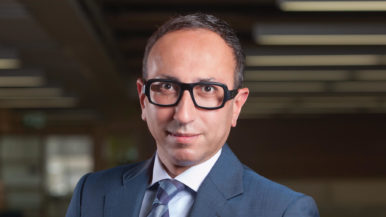The post-pandemic future: We’ll turn city lands and golf courses into massive urban farms

Paul Taylor is executive director of FoodShare
Back in March, shoppers flooded supermarkets in a frenzy, emptying shelves of beans and yeast and toilet paper. And suddenly, Torontonians were terrified about how Covid-19 might affect their food supply chains. And yet hunger was a major problem in Toronto long before the pandemic—nearly one in five Toronto families deal with chronic food insecurity, and that number skyrockets for Black and Indigenous people.
We’ve allowed food to become a commodity when access should be protected as a fundamental human right. As a result, food is inaccessible to those who need it most. However, this time of upheaval offers us the chance to adopt a new approach to feeding our city. We’ve already got public health, transit and education systems—why not a public food system?
I envision a post-pandemic city where nutritious food is accessible to everyone, no matter where they live or what they earn. To do it, we’ll need to reallocate space, resources and power to the local leaders who are already doing this work. Let’s start with land. Community land trusts are non-profit corporations that acquire and steward land to protect it from the retail market. The land can be used for whatever a community needs, such as affordable housing, spaces for social enterprises or urban agriculture and community gardens. The support for these trusts in Parkdale and Kensington Market reflects a growing appetite for collective ownership of urban spaces. Going forward, we can build agricultural land trusts in our city’s suburbs. With changes to zoning bylaws, we can create vast swaths of growing space and transform our city into a hub for sustainable, ethical and hyper-local food production and distribution.
We have so much land at our disposal. For example, Toronto owns five golf courses that are losing money every year, which provide no benefit to their surrounding communities. We could establish permanent community-led urban farms and produce markets in these spaces. It’s been done before: in 2005, Seattle integrated a racial and food justice lens into all their municipal departments and provided huge tracts of public land for urban agriculture activities. They launched markets for immigrant farmers from Southeast Asia and East Africa who were residing in public housing to sell their food to other residents and to stores and restaurants. It’s been hugely successful.
By allowing people to control the distribution of their own food, we could provide Torontonians with the resources to meet their own needs. The majority of our food flows into the city from large-scale industrial farms, and the majority of profits flow out. We don’t need to settle for a food system that’s dependent on workers earning poverty wages in exploitative environments. Now that Covid’s keeping us inside, we could change city bylaws to make it easier for cooks to sell food prepared in their own homes. We could create government-subsidized produce markets and support the launch of community food hubs in every neighbourhood. And we could build on CERB and provide every Canadian with a monthly benefit redeemable for food that’s grown or prepared in the surrounding area.
Global disruptions like Covid-19 demonstrate that our food supply chain is precarious, exploitative and unsustainable, and data shows that in Toronto, how well you eat often depends on where you live and the colour of your skin. If we have the courage to reject the status quo of a food system based on racism and corporate hoarding, and instead build a community-based public food system, we could finally grow a city where good food is accessible to everyone.

































